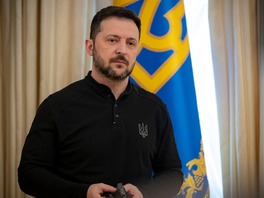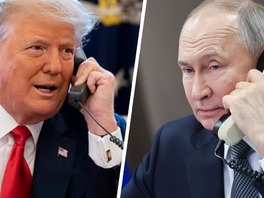While the United States prepares for a presidential election to take place in over a year (with first primaries scheduled for February), the democratic candidates are already leading an active campaign in their common goal to defeat Donald Trump. Debating on who is the best person to remove America’s current president from the office, the candidates announce their stances on both national and foreign policy issues – including Russia’s aggression toward Ukraine.
The Council on Foreign Relations, a nonprofit think tank focusing on U.S. foreign policy and international affairs, asked democratic candidates 12 questions on how they are going to address a series of critical foreign policy issues in event of becoming the next President of the United States. Question no. 4 read: “What, if any, steps would you take to counter Russian aggression against Ukraine?”
Joe Biden, current front-runner of the election polls and former Vice President of the United States, stated he “would make Ukraine a U.S. foreign policy priority”. Back in 2014, after Ukraine’s Revolution of Dignity, President Barack Obama named Biden the administration’s point man on Ukraine. Joe Biden, in turn, has always expressed his active position on Ukraine and its conflict with Russia.
In his reply to the Council on Foreign Relations, the former vice president noted he would expand Obama-Biden administration’s initiatives, such as training missions for the Ukrainian Armed Forces and security assistance. On the economic front, Joe Biden assured he would “work to increase Western direct investment and support for Ukraine’s energy independence from Russia, particularly if the Nordstream II pipeline is built in the coming year”. In addition, the potential democratic nominee voiced his support for America’s deeper involvement in diplomatic processes, working with allies to put heavier pressure on Russia.
Bernie Sanders, Vermont senator and Hillary Clinton’s opponent for the Democratic nomination in 2016, has also supported the Obama administration’s framework. Sanders stated that Russia’s further aggression would lead to increased pressure and heavier sanctions. Nevertheless, “our main priority should be to work closely with our European allies to help the new Ukrainian government make good on its promises to reform the economy, improve standards of living, and substantially reduce corruption”, as Senator Sanders noted. According to most current polls, Bernie Sanders scores close second – following Joe Biden – in the likelihood to defeat Donald Trump in general elections. It is, however, too early to predict any election results.
Cory Booker, New Jersey senator and former mayor of Newark, supports an increase in pressure and sanctions, criticizing Trump’s handling of the situation. “Russians are not just attacking Ukraine, or the U.S. -- they are trying to undermine democracy,” he stressed. Booker has personally visited Ukraine and aims to “repair any doubts about the U.S. commitment to its allies and partners in NATO.”
Kirsten Gillibrand, New York senator and lawyer, asserted that “rather than warmly greet Putin in confidential conversations, or weigh his assertions above U.S. intelligence assessments, I would continue a policy of sanctions aimed at the group of Russian leaders who have undermined Ukraine’s democracy, security and territorial integrity, and closely coordinate our policy with our European allies to deepen their impact.” Gillibrand also finds it crucial to “limit Russian nuclear weapons and provide information to the U.S. intelligence community.”
Beto O’Rourke, former Member of the U.S. House of Representatives from Texas, criticizes Donald Trump’s “cozying up to Putin” as well. He is ready to increase sanctions and believes it key to help Ukraine build institutions that will stabilize the country’s democracy and allow for (gas) independence from Russia. In addition, O’Rourke noted that Russia has become a cyber-threat and promised to work on securing American democracy.
Marianne Williamson, an American author, is also concerned with Russia being a serious cyber-threat for both Ukraine and the United States. “I support a vigorous investigation into the Russian interference in elections in the US, Ukraine and Europe, and massively strengthened cyber-security for US elections,” she noted.
An entrepreneur Andrew Yang shared the sentiment, affirming that “the Russian interference in Ukrainian elections was a precursor to their interference in US elections.” He believes it necessary to expand sanctions through the Global Magnitsky Act and help Ukraine defend itself, as helping Ukraine would also help the US to prepare for Russian aggression.
John Delaney, a former representative from Maryland, believes “the United States should take a leading role in demanding Russia’s return to its established borders.” In the case of becoming president, he would provide military aid, training, and impose targeted sanctions.
Joe Sestak and Pete Buttigieg both support sanctions against Russia and political, economic and defense aid to Ukraine, a country that has chosen a democratic path and needs to protect its sovereignty. Seth Moulton, a representative from Massachusetts, has taken it one step further, stating that the US needs to hold Russia accountable “by increasing sanctions to impose costs on the Russian government—ones that specifically impact Vladimir Putin and his close allies—and by continuing to provide lethal aid to Ukraine, a step the Obama administration should have taken”.
Some of the other top-5 democratic candidates (according to current polls), such as Elizabeth Warren and Kamala Harris, are yet to respond to the Council on Foreign Relations’ questions.
The 2020 United States presidential election is to take place on November 3, 2020.





